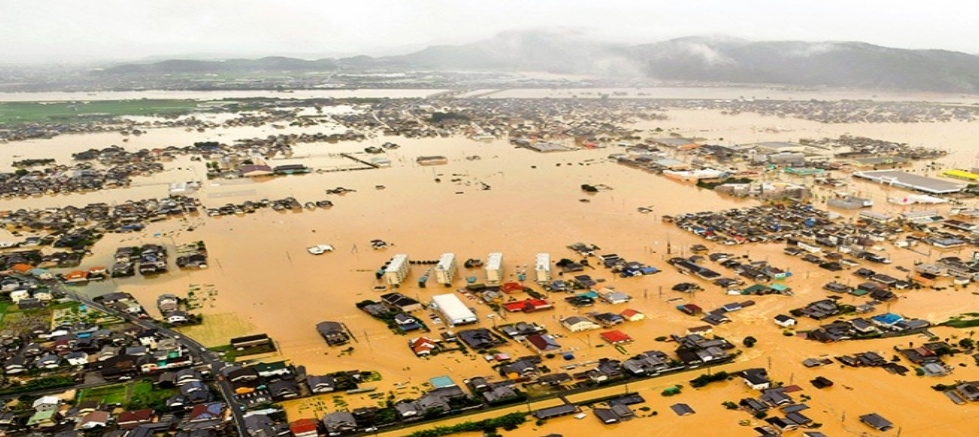U.N. says action ‘in this decade’ key in curbing global warming

Much of the Mabi district of Kurashiki, Okayama Prefecture, was flooded during torrential rains in western Japan in July 2018.
The global warming crisis is on the verge of becoming irreversible.
“The choices and actions implemented in this decade will have impacts now and for thousands of years,” the U.N. Intergovernmental Panel on Climate Change warned in strong language.
We should speed the process of making bold cuts in carbon dioxide emissions.
To curb damage caused by global warming, the international community has agreed on the goal of limiting the rise in global temperature to 1.5 degrees above pre-Industrial Revolution levels.
However, the temperature has already risen 1.1 degrees, according to the IPCC’s Synthesis Report for the Sixth Assessment Report, released on March 20.
If greenhouse gases continue being emitted at the current rate, the emissions limit for allowing the 1.5-degree goal to be achieved will be exceeded by 2030.
“There is a rapidly closing window of opportunity to secure a livable and sustainable future for all,” warns a passage in the report.
The document says that the upward trend in greenhouse gas emissions should be reversed by 2025 at the latest and emissions should be reduced 60 percent in 2035 from 2019 levels if the warming were to be limited to 1.5 degrees.
There are strong concerns that further global warming could make bouts of extreme weather more frequent and natural disasters more intense.
It cannot be concluded that global warming was the culprit for torrential rains that hit western Japan in 2018 and the heat wave of 2022.
But simulations have shown that both events were made more probable than they would have been in the absence of global warming.
With a temperature rise of 1.5 degrees, heat waves of the sort that happened once in 10 years on average in a climate without human influence would likely occur 4.1 times more frequently, according to the report.
Similarly, the report says heavy rainfall events that happened once in 10 years would likely occur 1.5 times more often.
Coastal levees and flood control measures could mitigate part of the damage to be expected, but only to a certain extent.
Glaciers and ice sheets, once melted, would not easily return to their original state even if the temperatures were to peak and drop in the future.
Curbing greenhouse gas emissions at an early date is a countermeasure that is both effective and indispensable.
Thousands of scientists and government officials helped work out the report, and scientifically well-grounded insights have been assembled on the basis of a large number of academic articles.
The report is based on data through 2021. The situation must have become even grimmer considering the impact of the trend for returning to fossil fuels that was prompted by Russia’s invasion of Ukraine in 2022.
U.N. Secretary-General Antonio Guterres called on developed nations to move up their target years for realizing net zero emissions to 2040.
“The climate time bomb is ticking,” he said.
The use of photovoltaic and wind power is spreading rapidly in many countries, and costs of power generation through such renewable sources have dropped significantly.
Japan has been slow in moving in that direction, however.
The nation would be left behind by the rest of the world both on the environmental and economic fronts if it were to adhere to the use of fossil fuels and lag behind in technological development.
Stepping up measures for reducing emissions will be discussed not only at the 28th U.N. Climate Change Conference of the Parties (COP 28) to be held at year-end, but also at the Group of Seven meetings, which Japan will be presiding over this year.
The country would fail to elicit confidence as the G-7 president if it were to make no headway in taking corresponding measures.
Japan should take the lead in presenting new numerical targets and prompt the rest of the international community to fall in line with them.
–The Asahi Shimbun,



